
City Living in New Jerusalem
Notes and Speculations about life after the Rapture for true Chrisisans

Notes and Speculations about life after the Rapture for true Chrisisans
by Ray Stedman
In this present series in Genesis we are like explorers who have traced a mighty river to its sources and who are now beginning to grasp the character of the land in which they live. We have already traced in this chapter the causes of war, crime, and prejudice to their roots in the hearts of men who refuse to be honest before God. In this story of Cain and Abel we have a kind of human cameo of history, a microscopic picture of the entire scope of human history. That, of course, is why the Bible is always so contemporary; it deals with elements of human life that never change. Today we will take a closer look at what is called culture or civilization, and especially the part that city life plays in the shaping of human society. This is introduced for us in Verse 17 of Chapter 4:
In an earlier series we indicated that we have archaeological proof of this as an actual occurrence, for archaeologists have found that the word enoch is the earliest word for city in any human language. In the ancient area of the Tigris and Euphrates Rivers, the oldest inhabited cities known to man were called enoch. This was much as we refer to San Francisco as "the city," so they called this first town, "the city, "enoch. It is interesting that it was Cain who built the first city and generally turned the family into the state. He thus introduced the social and political problems that in this 20th century are screaming at us for solution. It is very suggestive that the first city was built by a condemned murderer. Now, it is clear from the 21st chapter of Revelation that it was ultimately God's intention for men to live in a city. The dream of the city which God intended for man runs throughout the whole of Scripture. Remember, we are told in the book of Hebrews that Abraham "looked forward to the city which has foundations, whose builder and maker is God," (Hebrews 11:10). So, from the earliest dawn of history, men were looking forward to the coming of a city. You will find references to it in the Psalms and other places. But everywhere in Scripture there is a contrast drawn between the city of God and the cities of men. God withholds his city and it has not come even yet. He withholds it for a very good reason: He is waiting until men are ready to live in a city. God first goes about solving the fundamental problem of humanity -- its self-will and defiance of authority -- and then he puts men together in the close life of a city. But we have reversed that. Man, in his arrogant pride, has assumed that he is quite able to live in close relationship with his fellow man and has clustered together in cities throughout history. The result has been all the violence, intrigue, social injustice, and long unending record of bloodshed which history records. Here is the supreme mark of the fallen man, clearly evident in this passage: He wants everything now! That is the trouble with man as he is today; he wants everything, right now: Instant luxury, instant comfort, instant relief, everything, now! To accomplish that, man ignores the problem of evil. He treats it as though it were nonexistent, dismisses it with a wave of his hand, regards it as merely trivia -- and goes ahead to build his city on the ground that is already red with the blood of his brother. That is the story of history. Now, it is a most imposing city he builds. The technical brilliance of man is evident even this early in the history of our race:
Even the names here are highly suggestive. As you study your Bible, learn to look up the meaning of Bible names. Sometimes there are differences of opinion as to what they mean, depending upon the root from which the name was taken, but these names are very significant: Irad, for instance, means "the city of witness," i.e., in this context, "witness to the glory of man." Already the idea of the exaltation of man is coming in and it will culminate soon in the tower of Babel, erected to the glory of man. Mehujael means "smitten of God," which is suggestive, perhaps, of a rather defiant attitude: "God has smitten, yes, but we're going to make a success of this anyway," is man's attitude. Methushael is most contemporary; it means "the death of God." You can see how far back in history that idea goes! Lamech means "strong" or "powerful," and again reflects clearly the boasting of man in his fallen state. Jabal means "traveler;" Jubal, "trumpeter;" and Tubalcain, "metalworker" -- especially with regard to jewelry and ornamentation. Now that is most remarkable. We have here all the ingredients of modern life -- travel, music and the arts, the use of metals, the organized political life, and the domestication of animals. All of this is admirable and progressive, and, as we have indicated, ultimately intended for man. Nothing that fallen man longs after was to be denied him, as far as God was concerned, but it was to be when man was ready for it. The whole tragic story of civilization is that man insists on it anyway, before he is ready for it. You know how often in history we have said that the story of some human event was "too little, too late," but here it is obviously "too much, too soon." These things look impressive, and it is desirable to have these comforts, luxuries, and advances, but what this passage so clearly brings before us is that it is all built on shaky ground. I do not think I could put that any better than to quote the words of Helmut Thielicke. In a study on this very passage, he says:
That is what we are trying to forget. We point boastfully at our great skyscrapers, our manicured gardens, our beautifully public avenues and parks and say all this is the mark of human ingenuity, human ability. But we cover up and try to ignore the tragic areas of abuse and privation, of darkness and injustice, of violence and intrigue that go along with man's accomplishments. But see how honest, upright and frank the Scriptures are. They make us face right up to this. The account goes right on to interject two more elements that must be included in an evaluation of human culture.
In this passage you have the first mention of polygamy in the Bible. Someone has said that polygamy has its own punishment -- it means more than one mother-in-law! But perhaps there is not even that here, for we know from the story of Cain that Lamech may have actually married sisters who had the same mother. Whatever the case was, at least here is the beginning of polygamy. It occurred to me that perhaps he was simply trying to do research into the nature and character of womanhood, studying it from A to Z, from Adah to Zillah! If you will forgive me that, we'll come back to the text and note that, whatever this is, it marks the unfailing accompaniment of civilization -- a sexual excess coming in which is openly tolerated. It traces back to this early Cainite civilization. The second element that is always present and necessary to properly evaluate culture is reflected in this oldest song in the world. Notice that these verses about Lamech are put into poetic form. They represent an early song, a kind of taunt on Lamech's part, in which he is justifying his violence. He boasts to his wives, "Listen to what I have to say: I have slain a man for wounding me." Evidently, a young man had assaulted him and, in self-defense, he says, "I slew him." He boasts of this to his wives and justifies it, saying that if God avenged Cain sevenfold for taking the life of his brother without any justification whatever, then, surely, "I will be avenged seventy-seven fold for having acted in self-defense." Here we have the first clear instance of a pattern that has repeated itself a thousand times over in human history -- the justifying of violence on the ground of protection of rights. Now there is a picture of civilization: Technical brilliance, producing comforts and luxuries; The substitution of the state for the family; The trend toward urban over rural life; The increasing toleration of sexual excess; and The passionate vindication of violence on the grounds of the protection of rights. Sound familiar? Has human nature changed in the thousands of years of history recorded since Cain? Not a bit. Does this sound familiar?
So said Socrates, 425 BC! Well, what is the problem? It reduces to the clamant cry of the human heart for everything, now! Men do not want to get ready for anything. They do not want to face the fact that perhaps they are not ready yet, that they need certain changes in themselves first before they are ready to move into close companionship with one another and live together. It is a refusal to acknowledge the glaring problems of human life. It is manifest in the superficiality of our lives, the fact that we make trivial things sound like they are horribly important. Have you been listening to the toothpaste ads on the TV recently? If you believed the ads, you would think that a certain brand of toothpaste could change your whole life. Those ads are intended to be taken at least in a quasi-serious way. The things that do change life we treat as mere trivia, only for religious people, those few people who can't keep their minds off the mystical. They are the ones to whom this change of life, this born again experience, makes its appeal. How clearly the Scripture puts its finger on the problem of human life -- this refusal of human beings to be healed first before they begin to claim the blessings God intends for the race. The cleansing of grace must come first, and then the seeking of God's city. This is why man has never been able to find what he has sought for in city life, because he is forever building his cities upon ground that is red with the blood of his brother. A father told me recently of the struggles of his son. It was the old, old story of the prodigal son who felt that what his father taught and believed was boring, uninteresting, and useless. Life made its adventurous appeal to him and he succumbed to the lure of new things and exciting adventures and relationships and refused to stay with his family. He got involved with drugs, women, and evil friends, and, finally -- almost wrecked in health and broken in spirit, so tortured and tormented within he was on the verge of suicide -- he realized what was happening to him, and, at the last moment, repented, came back, and found peace of heart and grace in the father's house. The father said to me, "I don't know why it is that he had to learn the hard way." Well, why is it? It is because men refuse to face the facts about life. For those who refuse to face the facts, there is no other way to learn than by hard experience, the grinding tribulation and tumult of having to live with facts we will not recognize. But it is not necessary. Even this early in the human race it was not necessary. Notice Verses 25 and 26 here, which close this chapter:
Once again these names are most suggestive: Seth means "appointed." Eve said, "I will call him 'Appointed' because God has appointed another son to take the place of Abel." When the man of faith is taken out of the world, God's work does not end; he raises up another. I have been so impressed by the epitaph on the tomb of John Wesley, in Westminster Abbey in London. I stood before it some years ago, and I have never forgotten it: "God buries His workman, but He carries on His work." And here too the work of God is going forward. He appoints another son, another man. The name of Seth's son was Enosh, which means "mortal." Here is suggested very clearly the idea that in the midst of this Cainite civilization, with its proud refusal to recognize the canker eating away at the heart of humanity, and its desire to achieve the luxuries and comforts that God designs, but on a false basis, there were yet those who recognized their mortality, and, thus, their dependence upon God. There were those who took God's appointed way, and, as the account goes on to say, "they began to call upon the name of the LORD." They recognized that God must heal our hearts before we can have all the things that our urges cry out for, that the cancer within us must be dealt with before we can begin to live. This has been the story of the Scriptures from beginning to end. All the way through, the Scriptures have been at pains to point out to us that there are only two ways to live. Jesus said so. There is the broad way, which many are taking, which looks so logical but which leads to destruction; and there is the narrow way, which begins at the point where an individual stands alone before God and must make a decision, the narrow way that leads unto life, as God intended life to be lived (Matthew 7:13-14). Which way are you taking? You young people here, you are facing the siren call of the world, with its appeal to luxury, comfort, ease, achievement, and acquisitiveness. It is not that Christians cannot use these things. The Apostle Paul tells us we are to use but not abuse the things of the world (1 Corinthians 9). But throughout the Scriptures we are warned "Love not the things of the world, neither the things that are in the world," (1 John 2:15 KJV). Do not make these the center around which you build your life. If this is all-important to you, you are doomed. You will not find life. Jesus said, if you try to save it on these terms, you will lose it, but if you lose your life for his sake, you will save it, (Matthew 16:24-25, Mark 8:34-45, Luke 9:23-24). Let God heal the sickness of the human heart with its hunger for self-centeredness, self-exaltation, its desire always to be in the center of attention; let God heal that through the working of the gospel, through the grace of the Lord Jesus Christ, then you can begin to live. It is the way that leads to life -- life as God intended it. It may be that this life will not include in it luxuries and comforts, but they are down the line somewhere. God has these in mind for all his people. All that the heart hungers after will ultimately be supplied in Jesus Christ. This is why the Apostle Paul cries out,
But it is only available to those who begin with the healing of the heart and the cleansing of the life in Jesus Christ. Prayer
Too Much, Too Soon
SERIES: UNDERSTANDING SOCIETY
APRIL 21, 1968
|

![]()
Speculations about HeavenPeople are far less interested in knowing God than we suppose!
There is none who understands; There is none who seeks after God. They have all turned aside; They have together become unprofitable; There is none who does good, no, not one.” “Their throat is an open grave; With their tongues they have practiced deceit”; “The poison of asps is under their lips”; “Whose mouth is full of cursing and bitterness.” “Their feet are swift to shed blood; Destruction and misery are in their ways; And the way of peace they have not known.” “There is no fear of God before their eyes.” (Romans 3:10-18) 8000 million people live on our planet today. That's way too many! (See Worldometers, and Population/Memory Loss by Steve Campbell). If 10% of earth's present residents know God through Jesus Christ, that would be a mere 800 million who are destined to live in God's city, New Jerusalem, ("who go to heaven" in other words) Adding in all those who have believed in Jesus since Pentecost, in the true Church Jesus has been building, could at least double the total. God wants no one to perish, He desires that none should be lost. Yet God can not violate our freedom to say "no." We have been made in God's own image, and we each have considerable freedom of choice. Only 5% of today's citizens of the world are Americans. Most are Blacks, Orientals, Hispanics, etc. Some observers claim that 20% of Americans today are Christians. This is more “reasonable.” We know it’s not going to be 100% (Universalism). But the majority of believers do not have a current, viable walk with Jesus, sad to say. (See The Church Papers). Half of the people joining us at the rapture (believers from the past since Pentecost) will have died between 33 AD and yesterday, so they won’t all share our present cultural values, knowledge, memory base, and our tastes in art, music, clothing, friends, and so on. Heaven will not be a Democracy but a Theocracy! That's hard to envision in light of our history!
The wedding is yet to happen. Jesus is not marrying us for our money, our good genes, or our good looks, or our head knowledge. Resurrection bodies won’t have bad breath. The Bride-to-be is a whole bunch of people headed for deep union and communion with the bachelor Groom. The Groom, Jesus, is the best qualified man who has ever lived. The Bride of Christ is not a single Jewish girl His age. She is millions of us, all ages and stages, males and females (only two genders), and from all walks of life. Lots of children!
“Human history is the long terrible story of man trying to find something other than God which will make him happy.” |

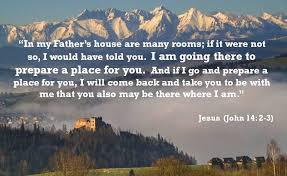 Everyone says they wants to go to heaven when they die. But the Place Prepared is for men, women, boys and girls who know Jesus as a living Person. The citizens of New Jerusalem have been called and chosen over the past 2000 years by God. Every citizen will know and cherish their personal relationship with Jesus Christ. He's the Lord of heaven and of earth.
Everyone says they wants to go to heaven when they die. But the Place Prepared is for men, women, boys and girls who know Jesus as a living Person. The citizens of New Jerusalem have been called and chosen over the past 2000 years by God. Every citizen will know and cherish their personal relationship with Jesus Christ. He's the Lord of heaven and of earth.
Brothers, join in following my example, and note those who so walk, as you have us for a pattern. For many walk, of whom I have told you often, and now tell you even weeping, that they are the enemies of the cross of Christ: whose end is destruction, whose god is their belly, and whose glory is in their shame— who set their mind on earthly things. For our citizenship is in heaven, from which we also eagerly wait for the Savior, the Lord Jesus Christ, who will transform our lowly body that it may be conformed to His glorious body, according to the working by which He is able even to subdue all things to Himself. (Philippians 3:17-21)
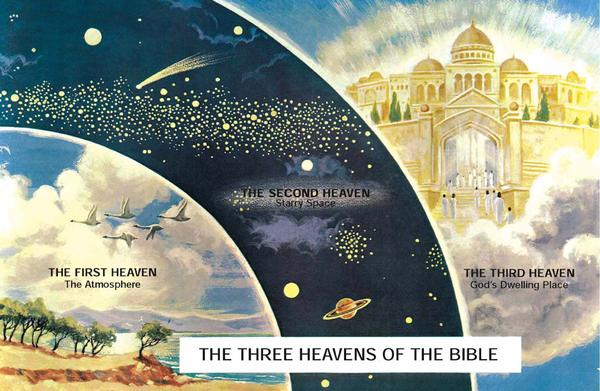

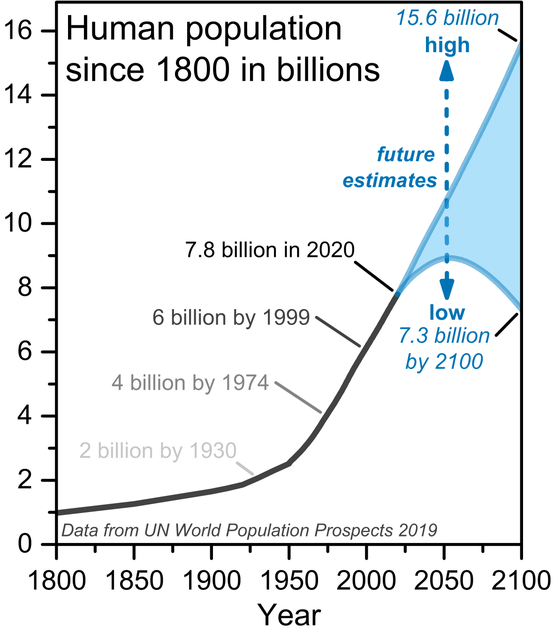
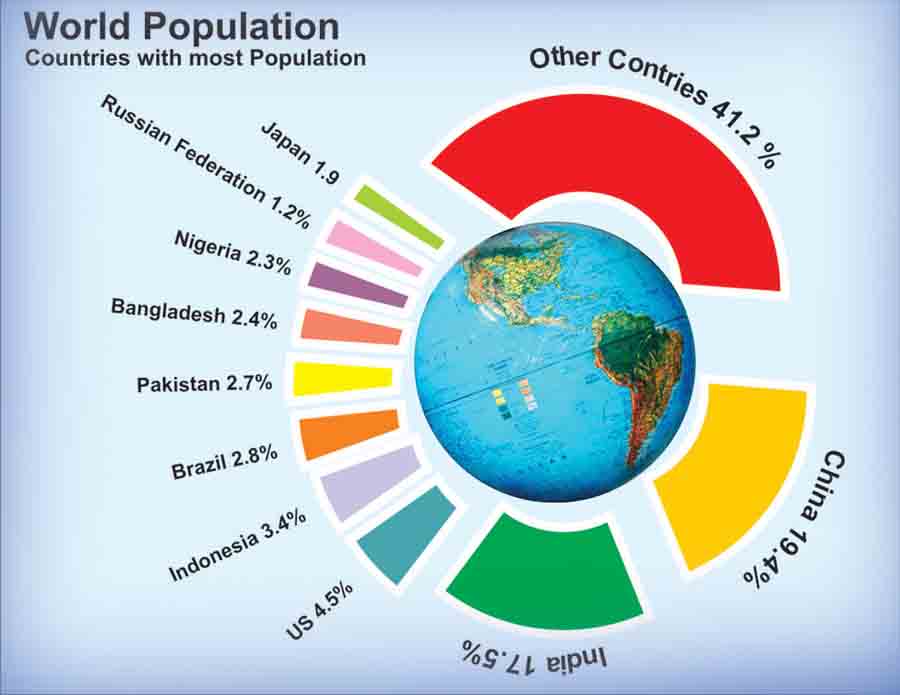
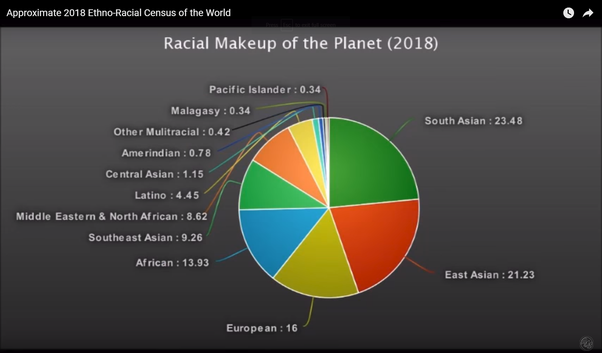
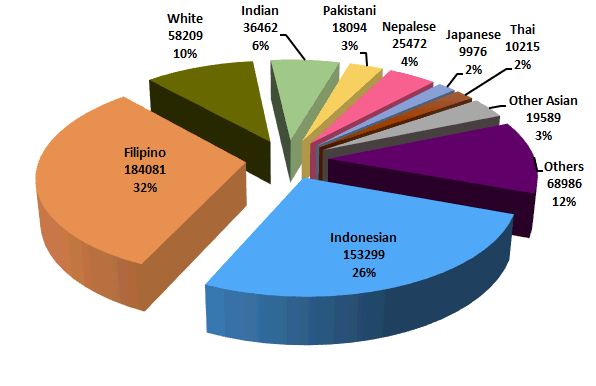
The Rapture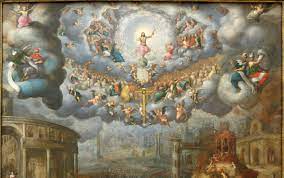
But concerning brotherly love you have no need that I should write to you, for you yourselves are taught by God to love one another; 10and indeed you do so toward all the brethren who are in all Macedonia. But we urge you, brethren, that you increase more and more; 11that you also aspire to lead a quiet life, to mind your own business, and to work with your own hands, as we commanded you, 12that you may walk properly toward those who are outside, and that you may lack nothing. But I do not want you to be ignorant, brethren, concerning those who have fallen asleep, lest you sorrow as others who have no hope. For if we believe that Jesus died and rose again, even so God will bring with Him those who sleep in Jesus. For this we say to you by the word of the Lord, that we who are alive and remain until the coming of the Lord will by no means precede those who are asleep. For the Lord Himself will descend from heaven with a shout, with the voice of an archangel, and with the trumpet of God. And the dead in Christ will rise first. Then we who are alive and remain shall be caught up together with them in the clouds to meet the Lord in the air. And thus we shall always be with the Lord. Therefore comfort one another with these words. (1 Thessalonians 4) |
God who IS Love desires that none should be lost and all that all who will may come. Yet in each generation only 10 or 20% of folks down on the planet apparently become saved. This would seem to be the testimony of history. The belief that all are saved, as in Universalism, can’t be defended from the Bible. God can’t violate our freedom of choice. He has made us very much like Himself in our free will. What behooves us who know Jesus is surely to each be fully available to our Lord without strings attached, so that Jesus, not “self,” is what outsiders see in us. I often wonder how many have turned away from Jesus because of me?
“I, Jesus, have sent My angel to testify to you these things in the churches. I am the Root and the Offspring of David, the Bright and Morning Star.”
And the Spirit and the bride say, “Come!” And let him who hears say, “Come!” And let him who thirsts come. Whoever desires, let him take the water of life freely.” (Revelation 22:16–17)
The Queen of Sheba was probably a black woman. Solomon of course was Jewish. The Bride of Christ is mostly a gentile--with a few embedded Jewish believers in Yeshua. Genital sexuality will be unnecessary in New Jerusalem.
“For in the resurrection they neither marry nor are given in marriage, but are like angels of God in heaven.” (Matthew 22:30)
Some men and women reading through the Song of Solomon find it erotic and sensually stimulating. It seems to me this is because of the projection of our own hearts onto the text. As we grow pure in heart in our relationship with the Lord Jesus we have less to project onto the book from our own unconscious unresolved issues. Some Jewish rabbis down through the ages have recommended that the book not be read by anyone under thirty years of age. The Song does produce highly subjective reactions in most readers. These reactions usually change over time indicating that the Song is a fully inspired part of God's Word. Like the rest of the Bible Canticles has life-transforming, redemptive power behind it. The Song mirrors back to the reader his or her own spiritual and emotional level of growth and maturity at all stages of life. No reputable scholar considers Song of Solomon to be erotic literature. It is a love story and there is a clear progression both of self-understanding of the lovers, and in their relationship as the story unfolds...
Christian commentators have long interpreted the Song of Songs as a picture of the Church as the Bride of Christ. God loves His only Son and by the Holy Spirit He has called out and prepared for Jesus a beautiful, virgin bride. In type this is illustrated in Genesis 24. Abraham's servant (type of the Holy Spirit) was sent by Abraham (type of the Father), into the far country to secure Rebekah as wife for his beloved Son, Isaac, (type of Christ). While Jewish symbolism sees Israel as the wife of God, the church is composed of Jews and Gentiles. In the present age of history the church is the special group of believers who are being called out to become the virgin Bride of Christ. This picture comes up several times in the Book of the Revelation. Similarly, the Apostle Paul writes,
"I feel a divine jealousy for you, for I betrothed you to Christ to present you as a pure bride to her one husband." (2 Corinthians 11:2)
"Be subject to one another out of reverence for Christ. Wives, be subject to your husbands, as to the Lord. For the husband is the head of the wife as Christ is the head of the church, his body, and is himself its Savior. As the church is subject to Christ, so let wives also be subject in everything to their husbands. Husbands, love your wives, as Christ loved the church and gave himself up for her, that he might sanctify her, having cleansed her by the washing of water with the word, that he might present the church to himself in splendor, without spot or wrinkle or any such thing, that she might be holy and without blemish. Even so husbands should love their wives as their own bodies. He who loves his wife loves himself. For no man ever hates his own flesh, but nourishes and cherishes it, as Christ does the church, because we are members of his body. "For this reason a man shall leave his father and mother and be joined to his wife, and the two shall become one flesh." This mystery is a profound one, and I am saying that it refers to Christ and the church; however, let each one of you love his wife as himself, and let the wife see that she respects her husband." (Ephesians 5:21-33)
The Wife of Jehovah and the Bride of Christ | The Marriage of the Lamb
The Revirginized | Your Wedding Invitation from Jesus | Made in the Image of God
Intimacy with God | Jesus Hasn’t Married Yet | Commentary on Song of Solomon.
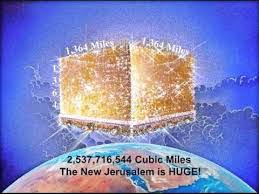 Now faith is the substance of things hoped for, the evidence of things not seen. For by it the elders obtained a good testimony. By faith we understand that the worlds were framed by the word of God, so that the things which are seen were not made of things which are visible...
Now faith is the substance of things hoped for, the evidence of things not seen. For by it the elders obtained a good testimony. By faith we understand that the worlds were framed by the word of God, so that the things which are seen were not made of things which are visible...
By faith Abraham obeyed when he was called to go out to the place which he would receive as an inheritance. And he went out, not knowing where he was going. By faith he dwelt in the land of promise as in a foreign country, dwelling in tents with Isaac and Jacob, the heirs with him of the same promise; for he waited for the city which has foundations, whose builder and maker is God.
These all died in faith, not having received the promises, but having seen them afar off were assured of them, embraced them and confessed that they were strangers and pilgrims on the earth. For those who say such things declare plainly that they seek a homeland. And truly if they had called to mind that country from which they had come out, they would have had opportunity to return.
...And all these, having obtained a good testimony through faith, did not receive the promise, God having provided something better for us, that they should not be made perfect apart from us. (Hebrews 11)

1 Now I say that the heir, as long as is a child, does not differ at all from a slave, though he is master of all, 2 but is under guardians and stewards until the time appointed by the father. 3 Even so we, when we were children, were in bondage under the elements of the world. 4 But when the fullness of the time had come, God sent forth His Son, born of a woman, born under the law, 5 to redeem those who were under the law, that we might receive the adoption as sons.6 And because you are sons, God has sent forth the Spirit of His Son into your hearts, crying out, “Abba, Father!” 7 Therefore you are no longer a slave but a son, and if a son, then an heir of God through Christ.8 But then, indeed, when you did not know God, you served those which by nature are not gods. 9 But now after you have known God, or rather are known by God, how is it that you turn again to the weak and beggarly elements, to which you desire again to be in bondage? 10 You observe days and months and seasons and years. 11 I am afraid for you, lest I have labored for you in vain.12 Brethren, I urge you to become like me, for I became like you. You have not injured me at all. 13 You know th at because of physical infirmity I preached the gospel to you at the first. 14 And my trial which was in my flesh you did not despise or reject, but you received me as an angel of God, even as Christ Jesus. 15 What then was the blessing you enjoyed? For I bear you witness that, if possible, you would have plucked out your own eyes and given them to me. 16 Have I therefore become your enemy because I tell you the truth?17 They zealously court you, but for no good; yes, they want to exclude you, that you may be zealous for them. 18 But it is good to be zealous in a good thing always, and not only when I am present with you. 19 My little children, for whom I labor in birth again until Christ is formed in you, 20I would like to be present with you now and to change my tone; for I have doubts about you.21 Tell me, you who desire to be under the law, do you not hear the law? 22 For it is written that Abraham had two sons: the one by a bondwoman, the other by a freewoman. 23 But he who was of the bondwoman was born according to the flesh, and he of the freewoman through promise, 24 which things are symbolic. For these are the two covenants: the one from Mount Sinai which gives birth to bondage, which is Hagar— 25 for this Hagar is Mount Sinai in Arabia, and corresponds to Jerusalem which now is, and is in bondage with her children— 26 but the Jerusalem above is free, which is the mother of us all. 27 For it is written:“Rejoice, O barren,You who do not bear!Break forth and shout,You who are not in labor!For the desolate has many more childrenThan she who has a husband.”28 Now we, brethren, as Isaac was, are children of promise. 29 But, as he who was born according to the flesh then persecuted him who was born according to the Spirit, even so it is now. 30 Nevertheless what does the Scripture say? “Cast out the bondwoman and her son, for the son of the bondwoman shall not be heir with the son of the freewoman.” 31 So then, brethren, we are not children of the bondwoman but of the free. (Galatians 4) |
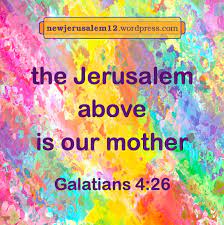

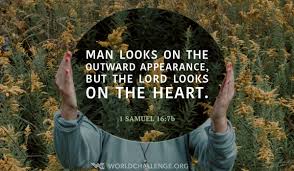
“...that the God of our Lord Jesus Christ, the Father of glory, may give to you the spirit of wisdom and revelation in the knowledge of Him, the eyes of your understanding being enlightened; that you may know what is the hope of His calling, what are the riches of the glory of His inheritance in the saints, and what is the exceeding greatness of His power toward us who believe, according to the working of His mighty power which He worked in Christ when He raised Him from the dead and seated Him at His right hand in the heavenly places, far above all principality and power and might and dominion, and every name that is named, not only in this age but also in that which is to come. And He put all things under His feet, and gave Him to be head over all things to the church, which is His body, the fullness of Him who fills all in all.” (Ephesians 1:17:23)

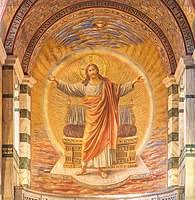
And I heard a loud voice from heaven saying, “Behold, the tabernacle of God is with men, and He will dwell with them, and they shall be His people. God Himself will be with them and be their God. “And God will wipe away every tear from their eyes; there shall be no more death, nor sorrow, nor crying. There shall be no more pain, for the former things have passed away.” Then He who sat on the throne said, “Behold, I make all things new.” And He said to me, “Write, for these words are true and faithful.” And He said to me, “It is done! I am the Alpha and the Omega, the Beginning and the End. I will give of the fountain of the water of life freely to him who thirsts. He who overcomes shall inherit all things, and I will be his God and he shall be My son... (Revelation 21:3-7)
But now Christ is risen from the dead, and has become the firstfruits of those who have fallen asleep. For since by man came death, by Man also came the resurrection of the dead. For as in Adam all die, even so in Christ all shall be made alive. But each one in his own order: Christ the firstfruits, afterward those who are Christ’s at His coming. Then comes the end, when He delivers the kingdom to God the Father, when He puts an end to all rule and all authority and power. For He must reign till He has put all enemies under His feet. The last enemy that will be destroyed is death. For “He has put all things under His feet.” But when He says “all things are put under Him,” it is evident that He who put all things under Him is excepted. Now when all things are made subject to Him, then the Son Himself will also be subject to Him who put all things under Him, that God may be all in all.“ (1 Corinthians 15:20-28)
Inasmuch then as the children have partaken of flesh and blood, He Himself likewise shared in the same, that through death He might destroy him who had the power of death, that is, the devil, and release those who through fear of death were all their lifetime subject to bondage. (Hebrews 2:14-15)
“...but has now been revealed by the appearing of our Savior Jesus Christ, who has abolished death and brought life and immortality to light through the gospel... (2 Timothy 1:10)
“...and how you turned to God from idols to serve the living and true God, and to wait for His Son from heaven, whom He raised from the dead, even Jesus who delivers us from the wrath to come.“ (1 Thessalonians 1:9, 10)
Your Timeline: You did not choose to be born nor pick your patents. Your bio dad determined your gender. You are a created spirit created, chosen, destined to live out your life. You were born mortal and have been appointed to die.
“...And as it is appointed for men to die once, but after this the judgment, so Christ was offered once to bear the sins of many. To those who eagerly wait for Him He will appear a second time, apart from sin, for salvation.“ (Hebrews 9:27, 28)
 The Place Prepared
The Place Prepared And if I go and prepare a place for you, I will come again and receive you to Myself; that where I am, there you may be also.“ (John 14:1-3)
For you died, and your life is hidden with Christ in God. When Christ who is our life appears, then you also will appear with Him in glory. (Colossians 3:1-3)
You've Been a Friend | Take your Shoes off Moses | El Shaddai | Thy Word s a Lamp Unto my Feet... | Marching to Zion
On Jordan's Stormy Banks | There is Power in the Blood| | Diamonds is the Rough | Short Life of Trouble | Canaan's Land
All the Good Times are Over |m All the Good Times are Lost and Gone | Heavenly Sunshine
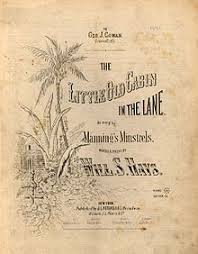
Little Log Cabin in the Lane
Oh I’m gettin’ old and feeble and I cannot work no more
The children no more gather ’round my door
And old masters and old mrs they are sleepin’ side by side
Near the little old log cabin in the lane.
Oh the chimney’s fallen down and the roof’s all caved in
Lettin’ in the sunshine and the rain
And the only friend I’ve got now is that good old dag of mine
And the little old log cabin in the lane
Oh the trees have all growed up that lead around the hill
The fences have all gone to decay
And the creeks have all dried up where we used to go to mill
And things have changed their course another way


Lambert's Main Library
Email Lambert Dolphin
Archive for Newsletters
Library Annex (500+ new articles since 2018)
Help Thyself. No Charge



June 22, 2020. June 28, 2022. October 5, 2022. February 28, 2023. April 23, 2023.